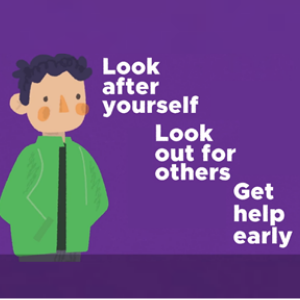
The suicide prevention charity Every Life Matters Cumbria, in collaboration with the North East and North Cumbria Suicide Prevention Network, have launched a new guide to looking after mental health and wellbeing during Covid-19. They have also produced three new short animations, as part of its “look after yourself, look out for others, and get help early” awareness campaign.
“Wellbeing and mental health during Covid-19: A guide to looking after yourself and others” was originally published last spring as the nation went into lockdown, and has now been revised to reflect our growing understanding of how we can protect our wellbeing during the pandemic, and further signposting to help and support.
Supporting the guide are a series of animations promoting the key messages of the campaign across the North East and North Cumbria:
Chris Wood, Development Manager at Every Life Matters, said: “We know a lot of people are feeling more stressed or anxious right now. These are challenging times, and though we have an end in sight now to restrictions we still have a way to travel, and Covid-19 will likely continue to exert an influence on our lives for most of 2021.
“It is important during this time to be kind to ourselves and keep doing the things that we now know are effective at protecting our mental health. And if you do find yourself struggling, remember that it is OK to reach out for help. The earlier we get support, the less a mental health issue will progress.”
The pandemic has also reminded us how important it is to look out for each other. Alongside an increase in mental health issues, many people have experienced increased levels of isolation during restrictions. And loneliness is strongly linked to increased chances of developing mental health issues. Support from family, friends, neighbours and colleagues is an important protective factor.
The smallest displays of kindness, like picking up the phone to check-in on someone, could make all the difference. If you are worried about a loved one or neighbour who may be struggling, check in and offer support. And don’t accept ’I’m ok for answer’. If you are really concerned ask twice, be persistent, and be helpfully nosey.
Katherine McGleenan, North East and North Cumbria Suicide Prevention Lead, said: “I have worked in the region as a mental health nurse for many years and know that getting the right information and support, at the right time, is not always straight forward. Often people either don’t know how or where to find support, or don’t want to ask for help, often due to the stigma.
“We hope that this guide and these animations will encourage people to start conversations. We want everyone, whatever their circumstances, to know there is support available, and to know how to access help if needed, and that they don’t need to cope alone.”
